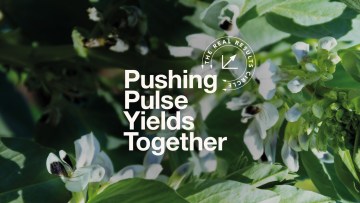June Pulse Check
21.06.2021

In this issue of ‘Pulse Check’ we speak with James Loder-Symonds, one of the directors of Nonington Farms Limited.
Situated in Canterbury in Kent, Nonington Farms is the only LEAF Demonstration Farm in the South East of England. The operation covers 1,250 acres. Nearly 400 acres are owned, the remainder is farmed under contract. Soils range from chalky loam to brick earth. The crop rotation includes beans, wheat, oats, and oilseed rape.
Traditionally the land was farmed on a high input / high output basis but today James is on the path towards regenerative agriculture. Profit per hectare is what is important, along with the sustainability of production systems.
What pulses do you grow and why?
“Normally we’d have 150ha of winter beans but this year we have around 190ha of winter beans and approximately 30ha of spring beans.
“There are a number of reasons for the increased acreage. It’s partly due to the rotation, but also a result of the challenge of establishing OSR due to cabbage stem flea beetle damage. The spring beans are part of a Countryside Stewardship Scheme option.
“Beans are profitable and relatively easy to grow. There are immediate returns as well as improvements in first wheat yields and longer-term soil health benefits.
We’re confident in the consistency of yields and returns that we can get from growing beans.”
How do you establish your winter beans?
“We direct drill into a cover crop and apply a pre-em herbicide. Later in the season they will also get some trace elements and a fungicide. They don’t need an insecticide.”
What are your most troublesome weeds and diseases, and how do you protect your crops?
“We’re sowing the crop in November when it is cold and the germination period for weeds like black-grass has passed. Cleavers, annual meadow grass and chickweed are more problematic but once the crop has got established in the spring, they tend to out-compete these weeds.
“When it comes to disease control, I’m very much into optimising soil health and natural controls. We apply trace elements like manganese and neutralised phosphates to control diseases such as downy mildew.
“This year we’ve tried Signum® for the first time. My agronomist recommended it as it was looking like it might be a high-pressure year for chocolate spot and rust.”
Your bean crop is in the YEN, why are you participating in this project? And what do you think of the non-competitive format for pulses?
“In comparison with cereal crops, there hasn’t been as much research into beans. Yet they are a really important crop within our rotation, for soil health and as a break crop, and I’m keen to have a better understanding of them.
While the competition is great for crops like wheat, it’s sometimes more important to improve the understanding of other crops, and the more knowledge, experience and ideas we can pull together, the better.”

